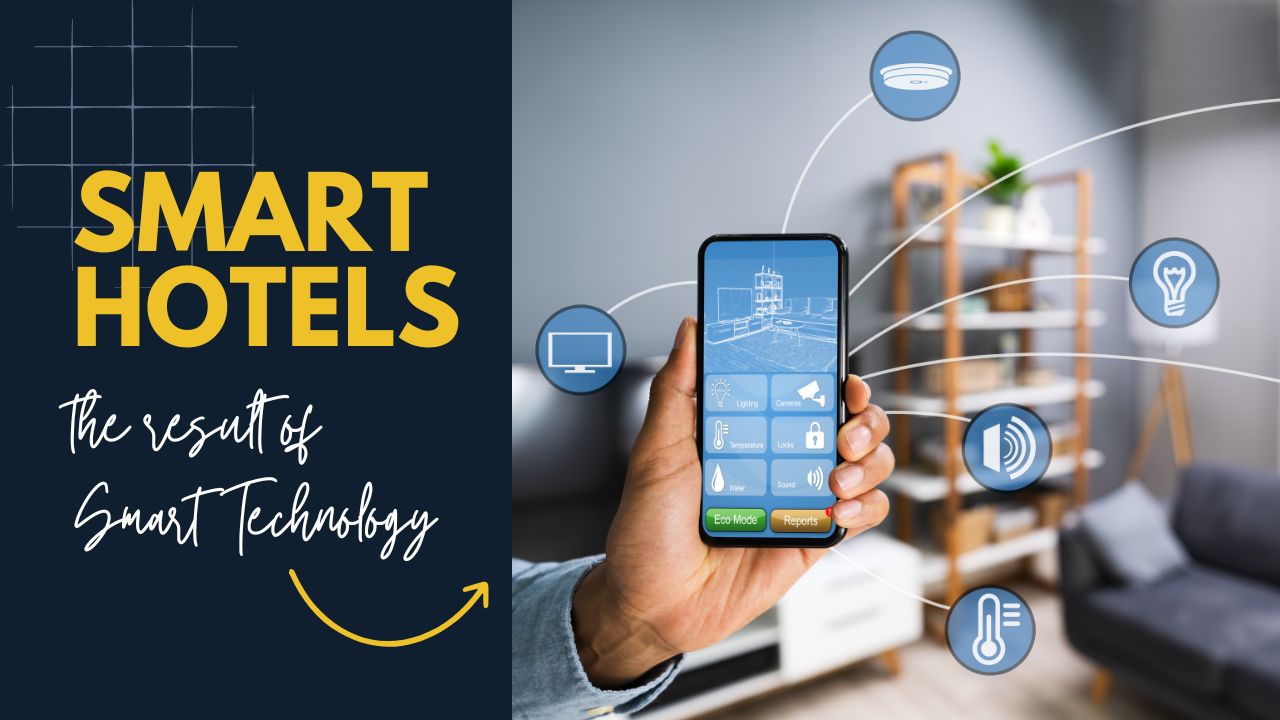“The biggest part of our digital transformation is changing the way we think.” – Simeon Preston
In all aspects of our daily lives, smart technology has a significant impact. The hospitality sector is not only exceeding expectations but also driving the adoption of smart business technologies. The employment of advanced technologies in the hotel sector has completely changed how hotels operate and how guests are treated.
As hoteliers become more aware of the shifting demands of the contemporary market, they are utilizing technology to build smart hotels that satisfy a market that is highly dependent on technology. By offering individualized services, smart hotel technology has helped hotels improve client experiences, optimize operations, and uphold environmental goals.
Before we begin, we can provide a little explanation of smart hotels. ✍️
? What are Smart Hotels?
The aim of a smart hotel is to enhance client service while simultaneously increasing administration, efficiency, and control by the hotel management. An establishment that utilizes cutting-edge technologies, such as artificial intelligence and the Internet of Things (IoT), is referred to as a smart hotel (IoT). Smart hotels incorporate cutting-edge technologies to the advantage of both hoteliers and visitors.
To keep up with the most recent hotel trends, hoteliers use technology to improve the guest experience and boost income. Ones that come to mind are voice-activated controls, intelligent check-in services, holographic technology, and robot concierges. The hospitality industry’s efforts to meet customers’ high expectations for digital experiences are what have contributed to the apparent increase in smart hotels.
Users may be able to manage several devices from a single control device, such as a remote control, smartphone, tablet, or smart speaker, thanks to these devices’ capacity to interact with one another. Devices may frequently access and use data from the internet, which enables them to respond intelligently to user demands.
?? Advantages of Smart Hotels
- Convenience
In order to meet the needs of their guests, each hotel strives to provide services that are proficient and effective. As a result, thanks to technology like smart self check-in, hotel customers may check in and out quickly using their mobile devices. Hotels can use technologies like these to help their management save time and dollars by optimizing their operations.
- Sustainability
Automated systems are one of the key features of smart hotels; they control energy consumption such as lighting and heating. Smart hotels can be equipped with smart thermostats and smart energy management systems in order to reduce energy consumption. Therefore, guests can use their smartphones to turn air conditioning on and off in order to save energy.
- Personalization
A higher level of personalization benefits both the guest and the hotel. Higher levels of personalization enable guests to swiftly customize their rooms in the manner of their choice, enhancing both comfort and enjoyment. As a result, the hotel will see increased levels of client satisfaction. By utilizing guest portals in hotel automation software, guests can communicate with hotel staff efficiently and immediately through mobile devices or smart apps.
- Operational effectiveness and cost
The intermediaries can be bypassed by hotels using intelligent automation. Also, by implementing a wireless and connected network of intelligent, eco-friendly gadgets, hotels may control and monitor energy usage, improving their energy efficiency and lowering costs.
The hospitality business is constantly looking for new ways to increase customer satisfaction. The industry is changing as a result of the quick pace of innovation and the expanded opportunities for smart hotel solutions.
❓ What do you think of the concept of smart hotels?
Which would you prefer—the traditional hotels or the smart hotel concepts?
Please, let me know in the comments section below. ☺️
References:




I like the idea of smart hotels. I think it is really important to develop digital tools nowadays.
Dear Varvara, I definitely agree! I think as soon as we accept that digital tools are our future, we will start to encourage them even more.
I will surely look at the ideas for smart hotels as a small hotel owner. It benefits both guests and owners significantly.
Thanks! 🙂
It’s really nice to hear this! I will post more content soon, so stay tuned.
A very exciting and informative blog post. I am looking Forward to the next posts.
Thank you!
Great blog post! I haven’t come across some smart hotels, but I’d love to stay there once 🙂
It’s really very helpful post! Thank you.
Thank you for your comment! I’m glad you found it useful. ?
As a person comming from an F&B industry, I can confirm the relevance and advantages that smart technologies could bring to our businesses. I love the content! I’m intrigued to see what next topic will be! Great work.
Really nice to hear this! Stay tuned for the more content soon.
I particularly love hotels that have no fear of implementing more and more technology. It facilitates the processes and makes everything a bit more cut to fit, which consequently, makes me want to go back or recommend it to friends and family.
Dear Samira, Thank you for sharing your thoughts on hotels that incorporate technology into their operations. In general, hotels that use technology have an edge over those that do not because they can provide customers with a more convenient experience, which can result in repeat business and positive word-of-mouth recommendations. 🙂
Thank you for this informative article. So far, I have never stayed in a smart hotel but I will keep that in mind when I book my next accomodation. I really like the advantages, especially that there is a sustainble aspect about it.
Hi Olivia, it’s wonderful to hear that the blog article was very helpful to you. It’s without doubt that having sustainable features makes them more appealing to visit. Please let me know how it went if you decide to visit them on your future trip. 🙂